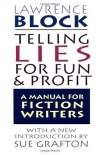Manual For Fiction Writers by Block, Lawrence (classic books to read .TXT) 📗

Book online «Manual For Fiction Writers by Block, Lawrence (classic books to read .TXT) 📗». Author Block, Lawrence
Someone?it may have been Hemingway?is supposed to have instructed all tyro writers to go through their work and cross out all the adverbs and adjectives. While a piece of prose thus treated would be precious close to unreadable, the underlying point is well taken. The vitality of English prose?and very likely all prose?abides in its nouns and verbs. The nouns are what is and the verbs are what's happening.
Consider the following passage:
Parker went through the window elbows first, the rotted wood and shards of glass falling out in front of him. He lowered his head, landed hard on his right shoulder, rolled over twice, and was moving before he was well on his feet. He heard shots behind him but didn't know if they were coming at him or not. He ran for a corner of the barn, and as he went around it a bullet dug into the wood beside his head, sending splinters toward his cheek.
He fell, rolled some more, until he was against the side of the barn and out of sight of the house. He put his hand inside his coat and touched an empty holster.
That's not bad writing. It's very good writing, actually, with fast action vividly described. But it's not quite as good as the actual way Richard Stark wrote this passage in The Sour Lemon Score. Here's his version:
Parker dove through the window elbows first, the rotted wood and shards of glass spraying out in front of him. He ducked his head, landed hard on his right shoulder, rolled over twice, and was running before he was well on his feet. He heard shots behind him but didn't know if they were coming at him or not. He ran for the corner of the barn, and as he went around it a bullet chunked into the wood beside his head, spitting splinters at his cheek.
He hit the dirt, rolled some more, and wound up against the side of the barn and out of sight of the house. He reached inside his coat, and his hand closed on an empty holster.
See the difference? When he goes through the window he dives and we sense the movement. The wood and shards of glass don't just fall out, they spray out. The bullet chunks into the wood beside him and we don't simply know it's there, we hear it and feel it because the unusual verb supplies sound and feeling. The bullet spits splinters at him, and the verb is doubly evocative, not only giving us a picture of what happens but endowing the moment with the contemptuousness of one person's spitting at another.
He doesn't drop or fall. He hits the dirt?it's more active that way?and he rolls and winds up against the side of the barn. He reaches inside his coat. His hand closes on an empty holster.
Wodehouse rewrote intensively. In a letter he described how he pinned pages of his current manuscript around the walls of his study, singling out those that were insufficiently energetic, returning to them again and again and reworking them. He was a perfectionist, convinced that every line of a Jeeves story had to have entertainment value.
Richard Stark, on the other hand, rarely does much rewriting. The two paragraphs quoted above very likely took final form in first draft. I don't do too much rewriting, either, but I have found when editing my copy that one change I'm apt to make involves verbs. When something's wrong with a sentence, more often than not it can be improved by changing a verb or two, making one of those action words more active, or more specific, or less ordinary, or, well, just plain better.
Back when I was in the eighth grade, right around the time dad and other barons made King John sign the Magna Carta, my English teacher had us think of synonyms for get. I have a feeling she may have been somewhat obsessive on the subject. In any event, she had us compile a lengthy list of alternatives for this verb, which she decried as banal, nonspecific, and a blight upon the mother tongue.
Well, early learned is late forgotten, and it's a rare morning when I type something like
I got dressed, got myself downstairs and out of the house, pausing to get the mail out of the mailbox. When I got to the corner I got a paper from the newsdealer, then got a good breakfast at the Red Flame. I got a headache when I got the day's first cigarette going, but I got the waitress to get me a couple of aspirins and that got rid of it. Then I got out of there. On the way out the cashier told me a joke, but I didn't get it.
For exercise, you might want to rewrite that deathless paragraph.
Then again, you might not.
I don't want to leave you with the impression that the unusual and colorful is always more desirable than the flatter and more ordinary verbs. What words you use and how you use them depends on what you're trying to accomplish, and that's as true with verbs as anything else. Colorless verbs have their place. So does repetition. There might be a time when you would want to write:
He walked to the corner, turned





Comments (0)